In the UK, eCommerce sales now account for 25.5% of the retail market – a percentage that’s set to rise to a third by 2024. Having a good eCommerce website is no longer a luxury, but instead is crucial for companies that want to stay competitive in an increasingly crowded marketplace. But building an eCommerce website can look like a daunting task, which is where eCommerce builders can help.
What is an Ecommerce Builder?
An eCommerce builder is more than just a template, and it’s the foundation of your eCommerce store. Unlike a generic website builder, it comes with a host of different functionalities built especially to help you run an online store. An eCommerce website builder can help you set up product pages, shopping carts, and payment methods, and even help you establish customer service connections.
The best eCommerce site builders come with tools that walk you through the process of hosting, designing, pricing and adding payment options – as well as marketing reports.
Key Features to Look Out For in an Ecommerce Platform
A good eCommerce platform should allow you to build your online store from scratch, either using code or by making use of built-in themes. It should also be mobile-friendly and allow you to run your store on the go.
Your eCommerce builder should have, at the very least:
- A high-quality, intuitive interface.
- A built-in shopping cart or a third-party app to allow you to process payments.
- Tools to help you keep track of orders and shipping.
- The ability to integrate with add-ons and other tools.
- Sufficient storage space. Before you opt for a specific eCommerce platform, consider how much you’ll be selling. If you anticipate lots of traffic, opt for a solution that gives you lots of storage space, inventory, and bandwidth.
- The right level of customisation. If you’re a more seasoned web designer, you will want to have the option to maximise your knowledge of code. If you’re new to website design, a site with built-in, attractive templates will be more suitable.
Also check for features including security and support, as well as the ability to build a site with sufficient shipping options, and the ability to create promotions. Not all sites offer the same options and some charge for extras. Finally, look for a program that’s easy to use. The less time you need to figure out how to set up your online store, the more time you have to sell.
10 Ultimate Ecommerce Builders
In this post, we’ll look at ten of the ultimate eCommerce website builders on the market. Whether you’re a complete beginner or a seasoned web designer, there should be an option that fits the bill.
1. Wix
Wix is ideal if you’re new to building an eCommerce website and is compatible with iOS and Android use. It enables you to create both a store and a business website simultaneously – with no need to use any code.
You can get started on your website using drag and drop items that you can add into one of the hundreds of Wix templates, making it quick and simple to create new product pages. There are also SEO-friendly components to utilise, to drive traffic to your site.
When you’ve finished creating your website, you can head on over to the Wix App Market. Here you can add apps to your site and access the eCommerce features you’ll need to start selling. You can add products, upload videos, and create coupons – as well as edit the cart, product, and order confirmation pages, so they match your brand—all great for limiting abandoned cart issues.
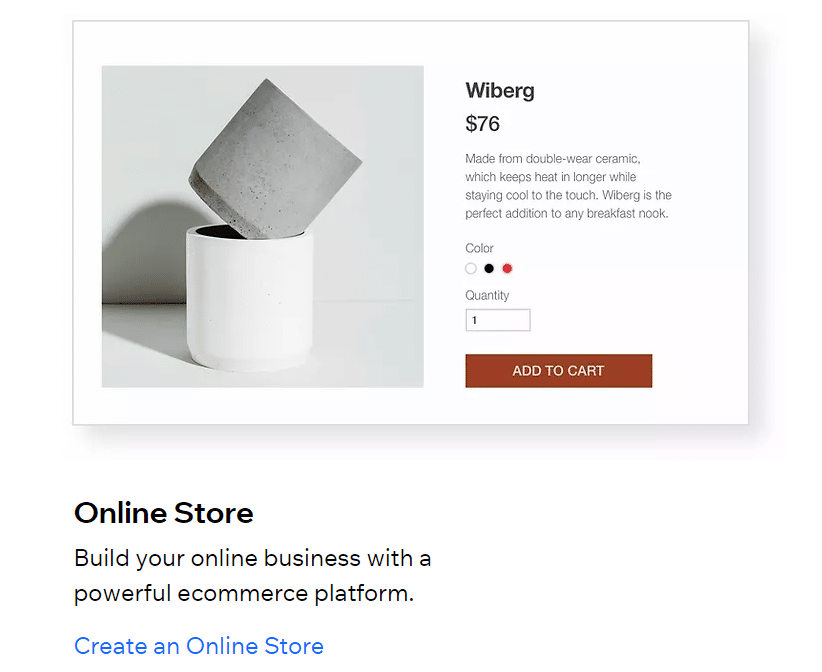
Wix enables you to sell on multiple channels including Facebook and eBay, and manage your store from one integrated dashboard – from orders to fulfilment and much more.
When you’re first starting, make sure you take the time to choose the ideal template, because you can’t switch to another without going back to the start and rebuilding your pages.
Wix is free, with no limited trial, and free hosting included.
2. Shopify
Shopify is perfect if you need to create a functional online store, pronto. It’s possible to sign up, choose a theme, and upload a product to your site in under ten minutes, using easy drag and drop features.
There are several professionally-designed themes which are free to use. Or you can upgrade and use a paid theme. The free themes relate to specific store types, such as apparel, or a specific style, such as narrative storytelling. And they’re fully customisable.
Shopify’s user interface is easy to get to grips with, and uploading products is simple. All you need to do is navigate to the dashboard and select ‘Products>Add product.’ Input your product’s title and description, add an image, and click ‘Save Product’. That’s it: You’re done.
You get access to a built-in shopping cart that integrates with hundreds of payment gateways and other third-party tools. Features include being able to set up discount codes and send emails to cart-abandoners. You can set up marketing campaigns on Facebook, Google, and more. You can also access useful extensions, including reporting and analytics tools.
Smaller eCommerce businesses can try Shopify for free, while ‘Shopify Plus’ is an eCommerce solution aimed at higher volume sellers.

3. Square
Square might suit you if you already have a physical store, but want to create an additional online presence. This eCommerce builder allows you to accept both in-person and online payments within one dashboard. Square also enables you to quickly access your orders, customer lists, and sales reports – and even pay your staff via the Payroll tab.
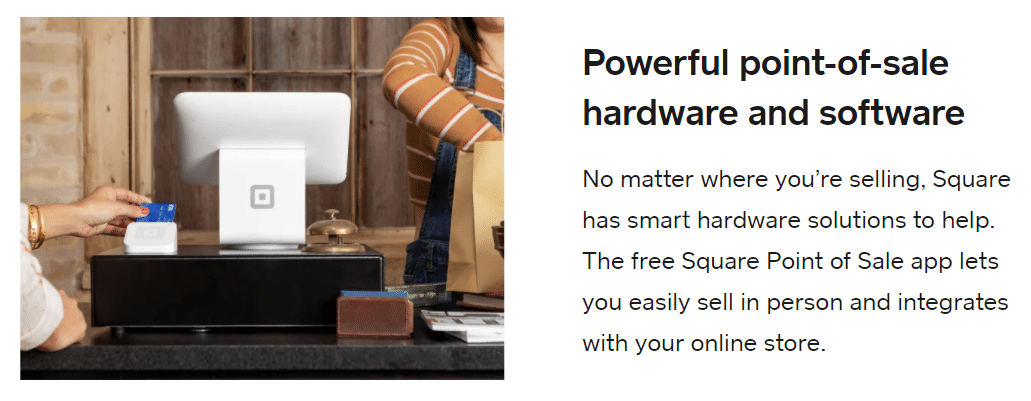
If you want to make a physical sale, select ‘Virtual Terminal’ from the menu, which will act as a digital cash register. With the Square credit card reader, you pay a fee to Square, and their information automatically uploads to your Square account.
The platform also allows you to market your business at an extra cost to create newsletters and coupons, and send out bulk emails. There’s help to set up campaigns with templates to add text, images, and change font colours.
4. OpenCart
Open cart is an eCommerce builder that gives you total control over your store’s design. You can install the platform directly onto your computer or opt for a cloud-based alternative.
Coding experience is essential if you’re to get the most out of OpenCart. By combining your coding experience with the available extensions, you will fully customise your store. Admin pages, product categories, marketing campaigns, page design, customer lists, and orders are the basics of getting your store up and running.
When it comes to extensions, OpenCart has lots to choose from. Over 13,000, in fact, with some paid and some free. These include payment gateways, themes, sales reports, and many other helpful features, with developers adding new ones every day. This is why OpenCart is often referred to as the ‘WordPress’ of eCommerce builders.
OpenCart is a good option if you’re a smaller company keeping tabs on your finances. That’s because it’s free, with the option to add unlimited products. You can also sign up for a Premium Plan. Paid extensions range in price, while transaction fees depend on the selected payment gateway.
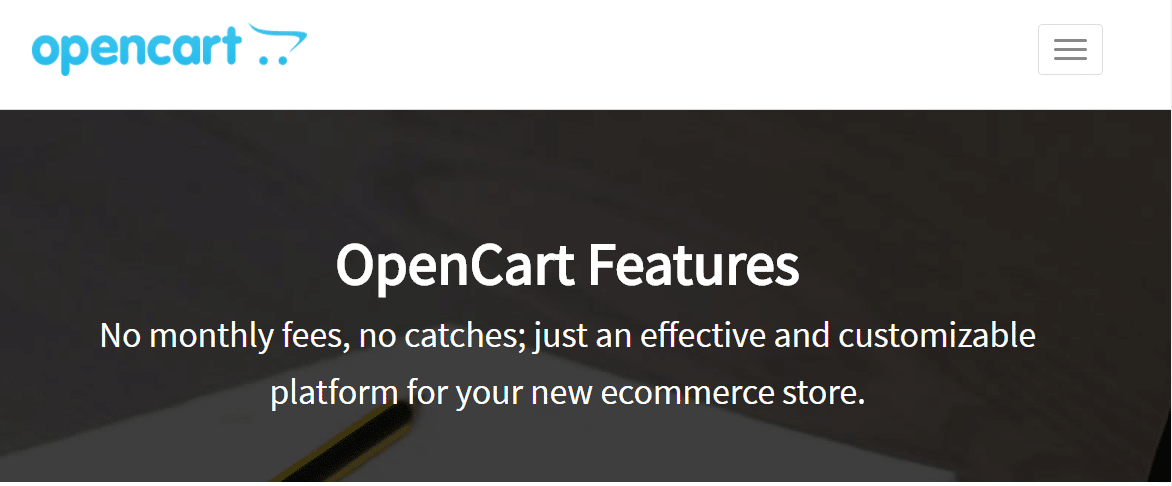
You can look for help in the OpenCart forums or get dedicated support for a one-off or monthly fee.
5. BigCommerce
BigCommerce could be the open-source eSaaS builder for you if you’re looking to expand your online store to more than one platform. To consolidate your shops add a sales channel via the ‘Channel Manager’ tab on the dashboard. Once you’re set-up, BigCommerce automatically starts importing your uploaded products to that platform.
If you make any changes to your products in the BigCommerce dashboard, these will be synced across all your store platforms. So, you don’t have to worry about having to change information across each channel manually. BigCommerce also keeps all your transactions from all channels together on the ‘Orders’ page – making it easy for you to monitor them by situating each logo next to each order.
BigCommerce also offers you a host of features. The Storefront section of the dashboard contains your design tools, like themes, logs, and social media links. While there are no drag and drop features to customise your storefront (basic knowledge of coding will help here), you can select a free theme from one of ten free designs.
BigCommerce is free for 15 days. Then you have to pick a plan ranging from Standard to Plus and Pro.

6. 3DCart
If you’re experienced at site-building, 3DCart could be an option. You can completely customise your online store to reflect your business and ensure your site offers your visitors the best customer experience.
3DCart has lots of features aimed at eCommerce companies that have web developers on board. You can build custom templates plus take advantage of many features at one fixed price. There are some themes available for use, but the software works best for those with a precise aim in mind when it comes to design.
The eCommerce builder is also set up to be a hub for marketing tools, with many third-party apps already installed on the dashboard. There are also helpful apps in the app store. 3DCart’s ‘Marketing Checklist’ helps you get started on boosting online sales, and you can choose one of three levels from beginner to advanced.
The beginner level introduces you to sign up for an Instagram account, while the advanced section talks you through cross-selling on Amazon.
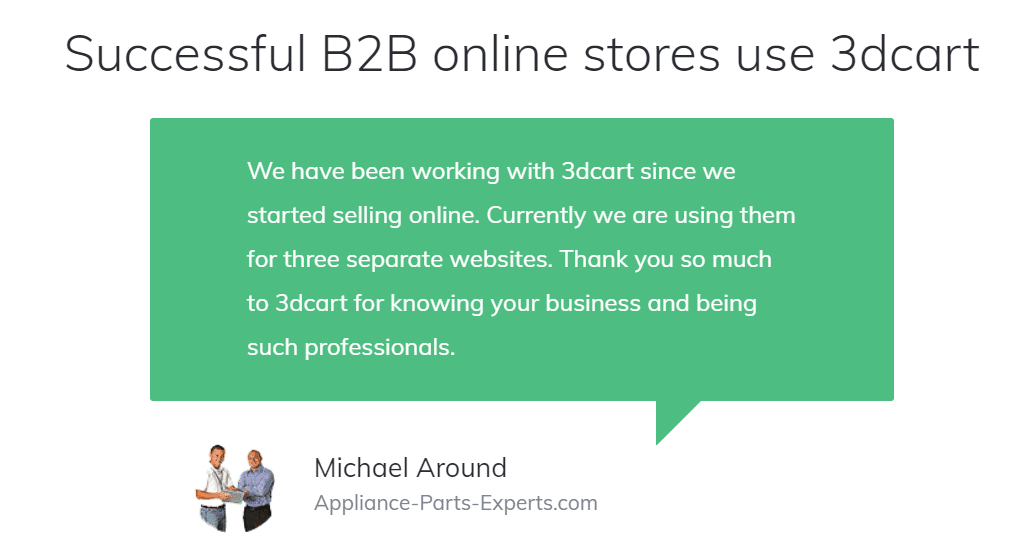
3DCart also has a range of search engine optimisation (SEO) tools that let you edit meta tags and deny crawlers to certain pages. Plus, you can integrate your Google Analytics account with the software.
There’s the option to sign up for a free (time-limed account), then 3DCart is priced competitively with no setup fees or transaction fees.
7. Big Cartel
If you’re a smaller business with custom products to sell, then Big Cartel could be an eCommerce builder to consider. While it may be more limited than some other eCommerce platforms, Big Cartel has a quick and simple set up process. It’s designed to enable those with a smaller inventory to get online.
There are some useful built-in features, and when you create an account, you’ll be walked through how to set up the store, add, and sell products.
It’s free to put up to five products online, while you’ll need to sign up to a monthly plan if you sell more than 50 lines. You can add one image per product and make use of a free customisable theme. Big Cartel gives you access to real-time stats and the option to run discounts and promotions.

8. GoDaddy
GoDaddy offers you the option of setting up an online store, along with shipping tools and payment options. You can add up to 5000 products with ten images per product, and allow customers to pay via all major credit cards, PayPal, and ApplePay.
GoDaddy’s website builder automatically optimises your site to ensure it shows up on Google and gives you integrated email and social media marketing tools. The streamlined mobile checkout helps you lower cart abandonment rates by helping customers check out quickly.
There’s also the option to use the online appointment system and share your calendar with prospects and clients.

You only need to add one product or service to get started – and you can change your payment and shipping options later. You can build a site for free, but you’ll need to opt for the monthly eCommerce plan to start selling from your online store. You’ll also receive marketing and 24/7 support as standard.
9. WooCommerce.
WooCommerce was designed for WordPress, so uses all the features provided by this platform and a host of features to help you run an online store. From handling inventory management and payment methods to the general look of your store.
You can choose from a range of available themes, then customise your theme via the WooCommerce dashboard. For instance, you can add a logo or change the background or font. Coding isn’t a requirement, but if you have some basic HTML knowledge, you can further customise it.
WooCommerce is free to use and powered by a community of developers – as the industry evolves WooCommerce evolves with it. Because WordPress powers your site, you own your site in its entirety.
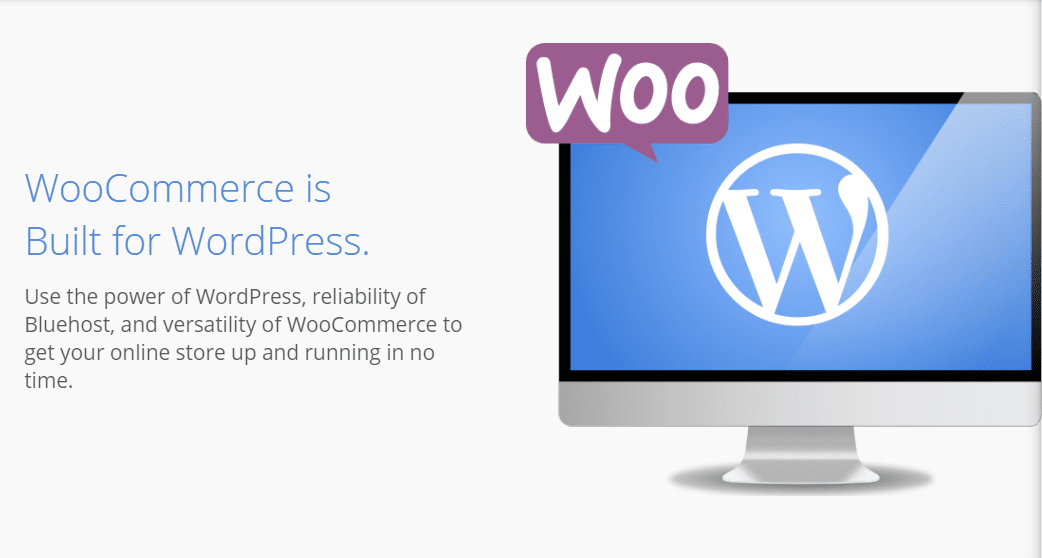
To get started with WooCommerce hosting, you choose the right plan and add your existing domain. Set up can be done in minutes, and then you can start selecting your store’s theme, adding your products, and setting up your payment information.
10. EKM
EKM allows you to create your own online shop with all the necessary features, including a free domain name and free SSL certificate. You get access to an account manager for the first six months – there to help you get set up quickly. A local support team is also on hand to help you manage orders and deal with the requirements of running an online business.
EKM gives you over 200 eCommerce themes to choose from, all of which are optimised for mobile and colour-customisable, so you can edit them to suit your brand.
Features include:
- Logo builder
- Product urgency features – E.g., free delivery messages
- Banners, graphics, and stock photos
- Responsive design, so the site looks good on all devices.
- Test shop – so you can test out new design features
There’s no limit to the number of products you can add to your store, and there are no transaction fees.
Sign up is free for 14 days, after which there is a monthly pricing plan which, while not cheap, gives you a host of features including support, analytics, and five employee accounts.
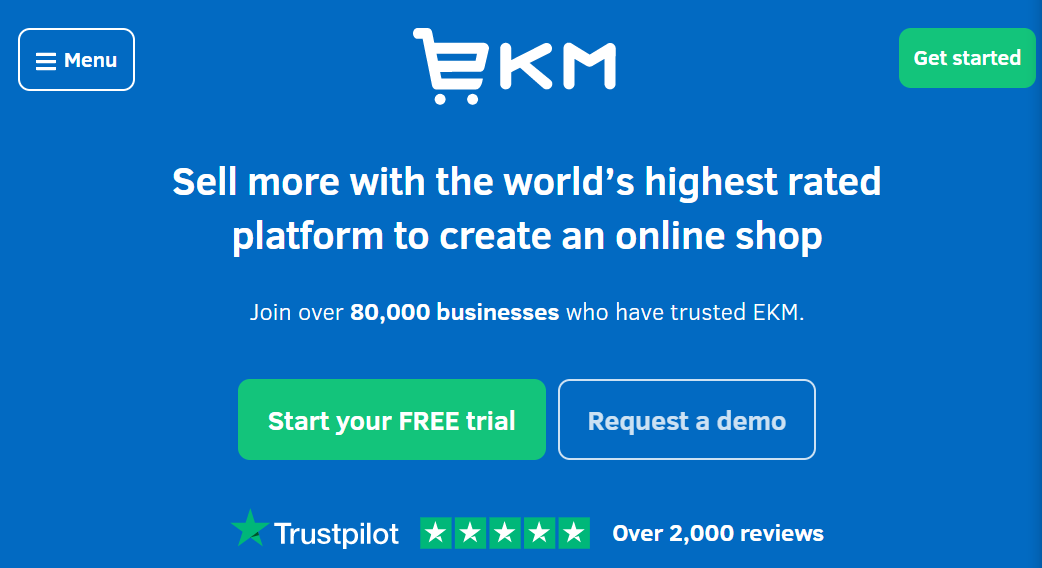
Conclusion
Ecommerce has transformed how people sell and buy online, and an online store gives you a fast, easy way for purchasers to shop from you without visiting a physical store. Today’s top eCommerce builders are designed to take the hassle out of setting up an online store, with some able to accommodate sales both online and at your bricks and mortar store.
A good eCommerce builder makes it easy for you to run promotions and keep track of orders and offer you site and payment protection. There are many eCommerce builders out there, so make sure you take the time to find one that suits your business and your pocket. As well as guaranteeing store visitors a streamlined and enjoyable customer experience.
Whether you already have a customer base or are starting from scratch; having the right tools at your disposal is essential. A good eCommerce builder can make or break your business, enabling you to streamline payments, accounts, shipping, and fulfilment options. All while creating an attractive online presence for visitors.
Originally published Jan 06, 2021, updated Jan 17, 2023



